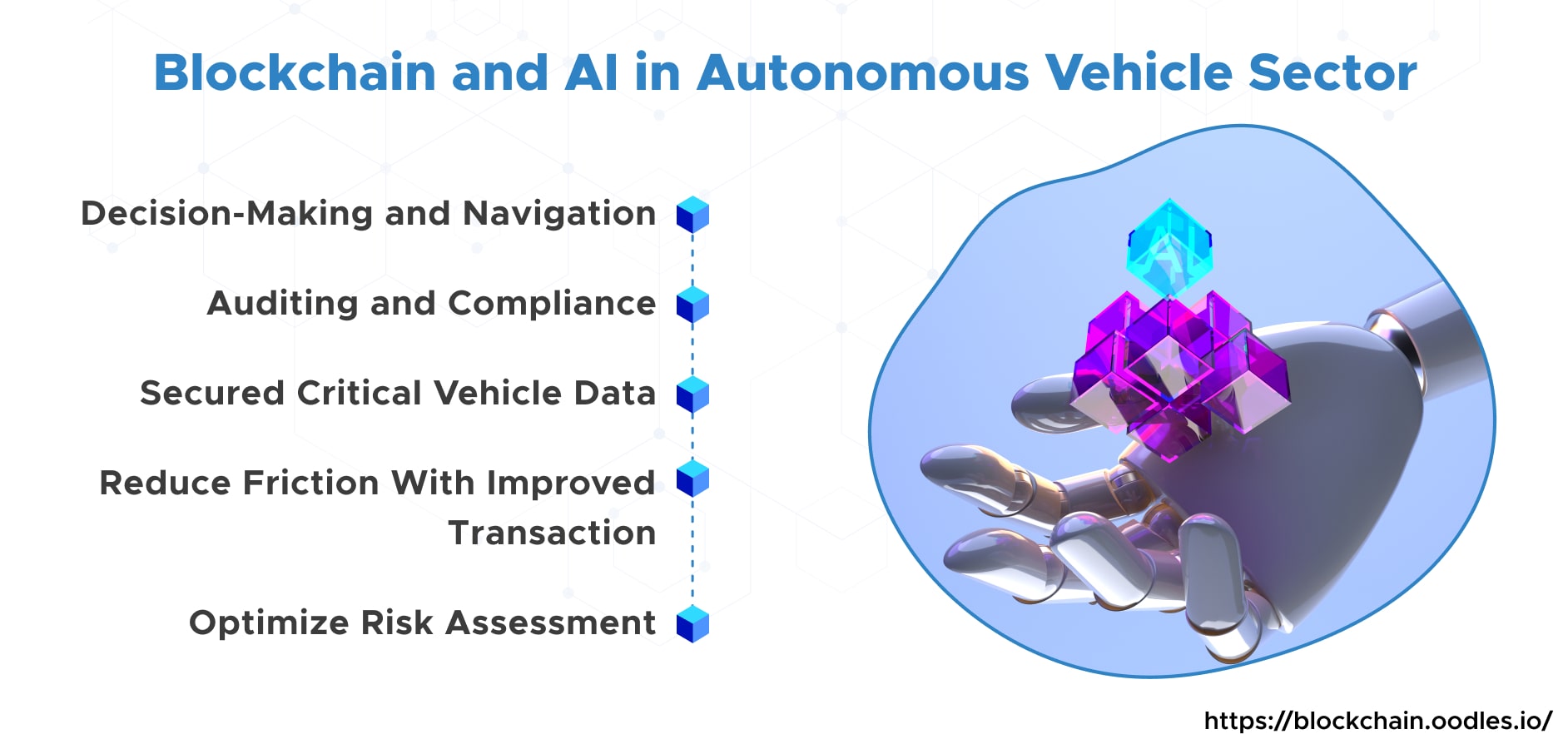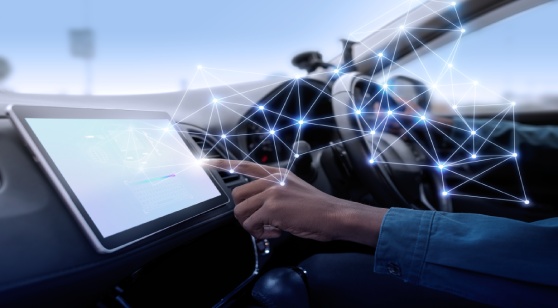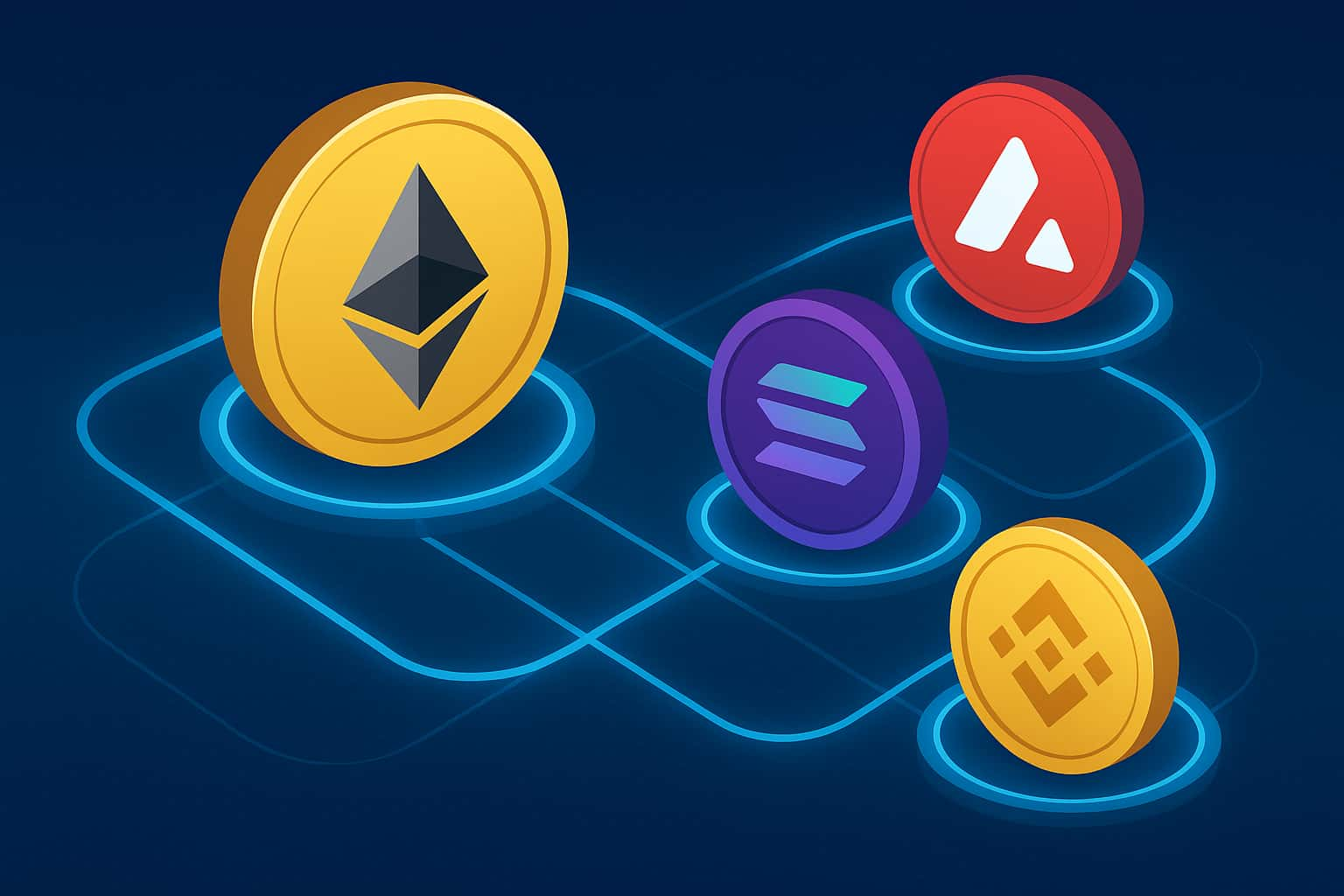-
Autonomous vehicles have become a symbol of innovation and progress in the transportation industry. With advancements in artificial intelligence (AI) and blockchain technology, the potential for revolutionizing autonomous vehicles is within reach. The power of AI and blockchain development services can pave the way for a future where self-driving cars are a common sight on roads.
In this article, we will explore how AI and blockchain can work in synergy to transform the future of transportation.
Blockchain and AI in the Autonomous Vehicle Sector
The convergence of blockchain technology and artificial intelligence (AI) has brought about exciting possibilities in the autonomous vehicle sector. This powerful synergy has the potential to greatly enhance self-driving cars, making them safer, more efficient, and more reliable.
Blockchain can provide transparency, immutability, and a decentralized nature. On the other hand, autonomous vehicles can also benefit from AI's advanced algorithms and decision-making capabilities.

Decision-Making and Navigation
AI algorithms are integral to the functioning of autonomous vehicles as they enable the processing of large volumes of sensor data in real time. Autonomous vehicles can use machine learning and deep neural networks to analyze complex scenarios, recognize patterns, and make informed decisions on the road.
On the other hand, blockchain technology can enhance decision-making and navigation in autonomous vehicles by providing reliable and verifiable data sources. Autonomous vehicles can use a blockchain to access decentralized and tamper-proof data, such as real-time traffic conditions, road updates, and weather information.
This trustworthy data can significantly improve the accuracy of decision-making algorithms. It enables autonomous vehicles to navigate more efficiently and make informed choices on the road.
Suggested Read | How the Automotive Industry is Getting into the Metaverse?
Auditing and Compliance
Blockchain technology enables comprehensive auditing and compliance capabilities in the autonomous vehicle industry. The decentralized nature of blockchain ensures transparent records of vehicle operations, including sensor data, decision-making processes, and maintenance history. This audibility ensures compliance with regulatory standards and allows for thorough post-incident analysis, facilitating continuous improvement and system refinement.
Secured Critical Vehicle Data
Autonomous vehicles produce vast data regarding driving behavior, vehicle usage, navigation, traffic, and more. Businesses have to store, analyze, and share this data without security risks.
Blockchain's distributed ledger technology ensures data integrity and immutability. It makes it highly secure for storing and sharing critical vehicle data.
Autonomous vehicles can utilize the blockchain for operational and sensor data sharing and management. It will ensure transparency and build trust among stakeholders, including passengers, regulators, and insurance providers.
Check It Out | Increasing Significance of Blockchain for Automotive Solutions
Reduce Friction With Improved Transaction
Blockchain technology in driverless cars offers significant benefits in improving transactions and communication between vehicles and infrastructure. It reduces friction, advances communication, and mitigates traffic bottlenecks.
One specific use case is the integration of vehicle-to-vehicle (V2V) microtransactions. Car owners can utilize tokens like Streamr's DATA token. They can use these tokens to pay for data from other vehicles, including weather forecasts, nearby gas prices, and congestion data.
Additionally, blockchain enables automated payments through smart contracts, simplifying multiple aspects of driving, including car maintenance, tolls, insurance, and more.
Also, Visit | Strengthening Automotive Operations with Blockchain Solutions
Seamless Mobility Services
Blockchain-based smart contracts enable the automation and enforcement of agreements in the autonomous vehicle ecosystem. These contracts facilitate seamless payment processing, vehicle sharing, and service provisioning without intermediaries. With smart contracts, autonomous vehicles can efficiently offer mobility services, enabling hassle-free transportation experiences for passengers while reducing administrative overhead.
A blockchain can facilitate speedy and efficient two-way communication among vehicles and supporting facilities on roads. It can develop a highly secure peer-to-peer network for transactions.
Additionally, all manufacturers can use the common drive and test database available on the decentralized network. This database includes simulations, experiments, and faults.
All these aspects of blockchain technology facilitate connected mobility.
Explore More | Thwarting Automotive Counterfeits with Blockchain Traceability
Optimize Risk Assessment
Blockchain technology has emerged as a promising solution for managing information and interactions in self-driving autonomous cars. IBM, for instance, filed a patent in 2019 to explore this potential.
By leveraging blockchain, businesses can employ various sensor IoT technologies to assess nearby drivers' behavior, capturing valuable data. Subsequently, they can use this data to optimize risk assessment by comparing anticipated and actual maneuvers of nearby vehicles and drivers.
Also, Discover | Automotive Operations on Blockchain Smart Contracts
Conclusion
Blockchain and AI in autonomous vehicles hold significant potential. Businesses can use the power of AI for enhanced decision-making and navigation. Moreover, a blockchain's transparency and security further reinforce these qualities.
As automakers and infrastructure businesses embrace blockchain's capabilities, we can anticipate a transportation future that is more efficient, secure, and autonomous.
Looking to embark on a blockchain-based project? Feel free to get in touch with our team of professional blockchain developers. We're here to assist you in turning your vision into a reality. Contact us today to get started!

Our Offices
INDIA
Emaar Digital Greens, Sector 61,
Gurugram, Haryana
122011.
Welldone Tech Park,
Sector 48, Sohna road,
Gurugram, Haryana
122018.















